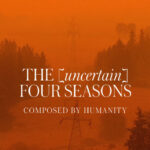We have an incredible track record here at the Saskatoon Symphony Orchestra. There has not been a single Covid-19 related incident at the SSO since the start of the pandemic. We are also one of the only orchestras who were able to perform all of our planned concerts in the last year. (Minus the one canceled due to a snowstorm!) That is no accident. It is thanks to careful planning and precautions agreed to by all of our people that we have been able to continue our artistry and livelihood safely.
 Now that we have an audience in the room it’s more important to us than ever that we keep our events covid free. Since Opening Night we’ve required that everyone, and we mean everyone, interacting with your orchestra is fully vaccinated. All our musicians, guest artists, staff, and volunteers have proven their vaccination status. Before your ticket is scanned there is a wonderful volunteer checking your vaccine status. Everyone in the room is wearing masks and we’ve encouraged you to spread out in our concert spaces to your comfort level.
Now that we have an audience in the room it’s more important to us than ever that we keep our events covid free. Since Opening Night we’ve required that everyone, and we mean everyone, interacting with your orchestra is fully vaccinated. All our musicians, guest artists, staff, and volunteers have proven their vaccination status. Before your ticket is scanned there is a wonderful volunteer checking your vaccine status. Everyone in the room is wearing masks and we’ve encouraged you to spread out in our concert spaces to your comfort level.

As much as possible we have eliminated intermissions from our concerts to minimize mingling so most shows run just over an hour. All of our venues have great air circulation and we improve that on stage with fans as several studies have shown increased air circulation is important to stop the potential spread of the virus. These are just some of the steps we take every time we are gathered in a performance space to create a safe and Covid-19 free environment.

Not every concert is able to be live-streamed this season for various reasons, but we are planning to have our audience present for every single performance. Having you in the room with us is a magical experience. The energy improves performances and there’s nothing quite like the thunderous applause we’ve been fortunate to receive after our first few events. It really is quite something to be in the room as the music happens.
Keeping you safe, keeping all of us safe, is the only way we can continue. We mainly rely on ticket sales and donations to keep this organization going and in return, we offer innovative and moving performances, meaningful connections, and countless unforgettable moments.
We laugh, we cry, we experience the music together. Most of all we continue to keep everyone safe so we can make it to 100 years of the SSO, and many years beyond that, all the while enjoying the incredible performances along the way.
